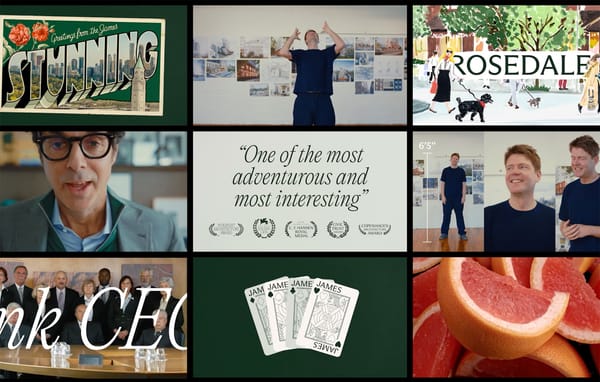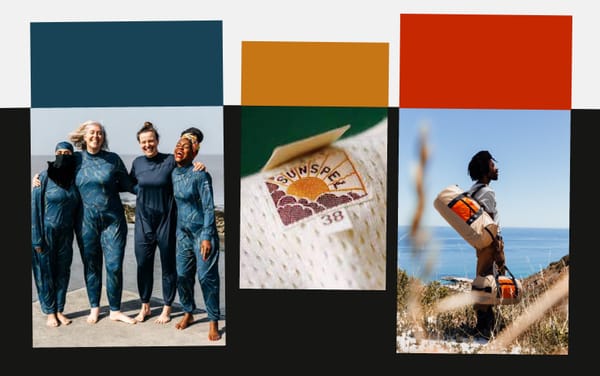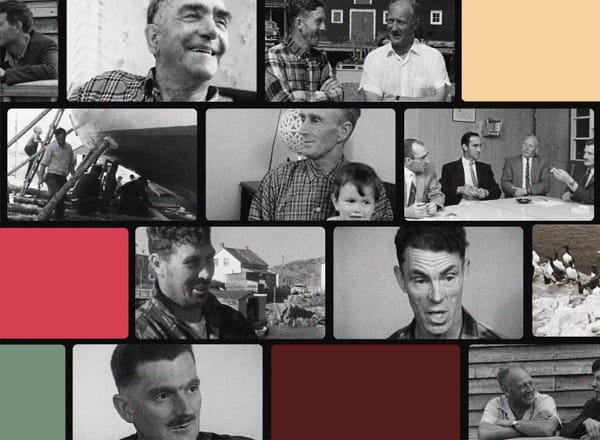It Takes Two
A good conversation is a gift

Hi everyone,
I’m Brian Sholis and this is Frontier Magazine, a weekly publication about new ideas in the arts, technology, and the built environment. Welcome to our new subscribers! Last week we turned on an optional paid subscription—and talked about why we aren’t putting anything behind a paywall. I’m grateful to everyone who signed up, shared our stories, or both.
The next big item on the Frontier Magazine to-do list is re-launching our podcast, which has me thinking about interviews. I’ve always loved reading or listening to long and probing conversations, whether between a subject and a well-prepared interviewer or between two artists with overlapping interests. Early in my career, I launched an interview column at Artforum and thrilled to every one of the dozens of conversations it let me have. Preparing for and conducting an interview, I have a license to be interested, to dive deeply into a fascinating subject or body of work, to practice good listening, and to help someone share the wisdom they’ve accumulated. A good interview is a gift to both participants and listeners or readers.
Two of the best literary interviewers have recently hung up their microphones. Last year, Michael Silverblatt, host since 1989 of KCRW’s Bookworm, paused work on the show for health reasons. Two weeks ago, Eleanor Wachtel, who co-created the CBC’s Writers & Company in 1990, announced she is stepping down from her duties. I’ve had their voices in my ears for decades. What Kevin Lozano wrote recently about Silverblatt applies to both: “What unites his guests is their willingness in conversation to go past the imperative of publicity, to talk about their writing in a way that seems almost private and intimate, to learn about their own work alongside the interviewer until it seems novel again.”
While Marc Maron has popularized unscripted, shaggy conversations, I strongly prefer Silverblatt and Wachtel’s more polished work, which finds its printed counterpart in publications like The Paris Review and The Believer. Going “past the imperative of publicity” is a goal I have for the conversations with artists, software developers, architects, tech leaders, and others that we’ll release in the coming months. In the meantime, below you’ll find a fistful of recent interviews that have stayed with me, plus our usual selection of good links.
Love all ways,
Brian
In e-flux journal, artist and writer Jace Clayton interviews theorist Tina M. Campt about using concepts, responding to artworks, learning from artists, “thinking in chorus,” and being an optimist
Campt: “There is a way in which Black artists and Black scholars in particular need—and we need this urgently—to create a set of critical concepts that allow us to address our moment. And the way in which artists are doing that is to activate concepts in ways that show us something very different than the way in which we (as scholars and theorists) parse concepts. […] I write about the impact of artworks rather than necessarily about the artwork itself. I write to artworks rather than about them, to the extent that I’m telling them what they are doing to me. And I think that’s a really important thing. Rather than telling others what a particular artwork is about and prescribing how they should see it or hear it or interact with it, I’m trying to create a journey that I’m inviting you to go on with me.”
On his podcast, economist and public intellectual Tyler Cowan speaks with writer Katharine Rundell about metaphysical poet John Donne, rooftop walking, and the value of “unruly childhoods.”
Rundell, on seventeenth-century Britain: “I think it does look to us, now, like a time where a febrile intensity of thought became not just commonplace but contagious. Certainly, you could wake up in the morning, and you could see acts of great devotion and great violence before breakfast. You could see a man burned for his belief. You could see a woman hung for hers. You could see people willing to push large beliefs on themselves to the point of death.”
In Granta, writers Caryl Phillips and Pico Iyer discuss migration, V.S. Naipaul, and the meaning of home.
Phillips: “Is this the true price of migration? A loss of ‘home.’ Not a loss of home that might only be measured geographically, but perhaps more importantly a loss of ‘home’ that might be seen in terms of people. With the act of migration gaps begin to open up—gaps of misunderstanding and confusion, that we’ve spoken of, and these fissures and cracks often cause divisions in families. Particularly between parents and children. Perhaps this is the real price that migrants pay; what they often lose sight of is not a place—a territory, a town, a country—they lose sight of people, including people who are living under the same roof with them.”
On his podcast, journalist Ezra Klein talks with philosopher C. Thi Nguyen about how life is increasingly structured like games, and not in a good way.
Nguyen: “What makes the experience of games so compelling, and so beautiful, and so dangerous, which is that they simplify the value landscape. I’m trying to live a good life and all the values that are out there for me are really complicated and really weird. Like, I am trying to parent, and be a researcher, and participate in the teaching community, and keep myself happy and not melt down during the pandemic. And it’s hard to know how to measure these values off against each other. And it’s hard to know how well I’m doing. But games give you this one moment where instead of the nausea of a billion different values and you have no idea how well you’re doing—games give you a moment where you know exactly what you’re doing because there are points.”
🔗 Good links
- 🥐 In search of the best croissant in protest-filled Paris
- 👩🏻💻 My friend Joakim Jansson has launched The Index, a thoughtfully compiled directory of design studios, designers, and type foundries.
- 🏃🏻♀️ Any Distance, the activity-tracking app briefly profiled in our November 29 issue, has launched “a supportive, personalized social network” and it has many thoughtful touches
- ☪️ A Ramadan calendar designed by Shiraz Abdullahi Gallab and published by the wonderful independent Chicago art-book store INGA. Free or $5 donation to a good cause.
- 🚲 Colin Nagy on how Dutch bike company Vanmoof reduced shipping damages by 70% by putting a different picture on the box
- 🌈 The Architect’s Newspaper on the visionary, early twentieth-century architectural drawings of Paul Goesch, now on view at the Clark Art Institute





